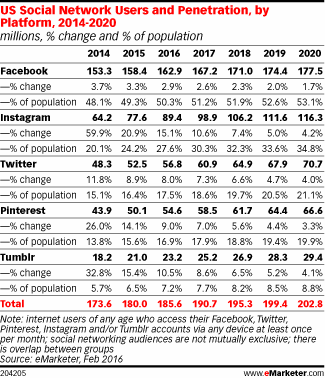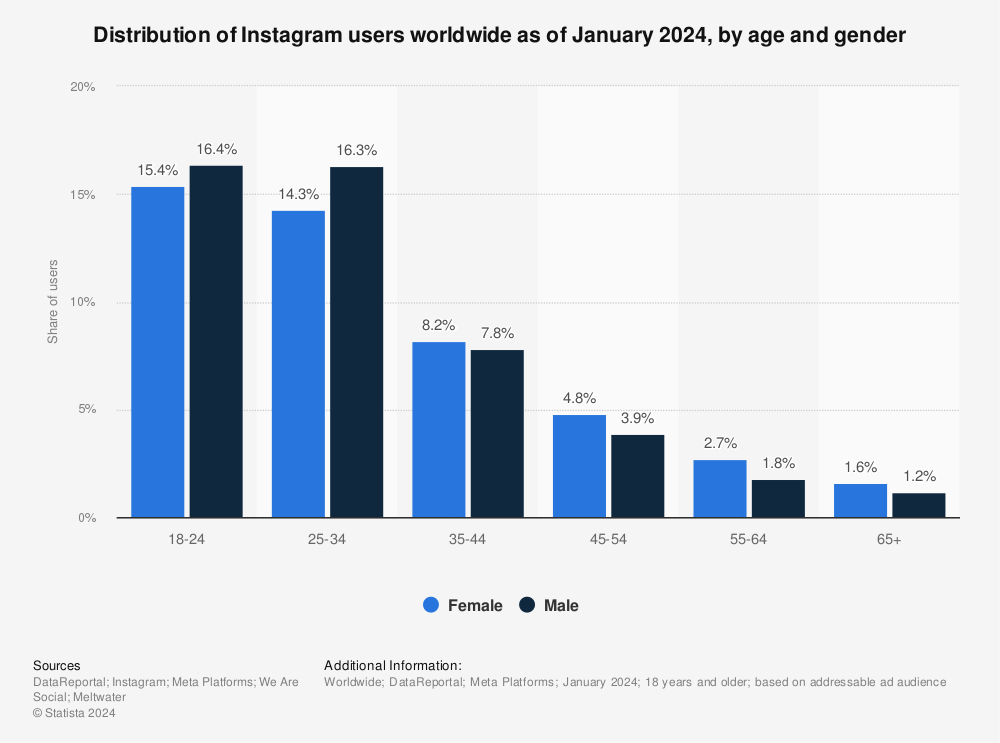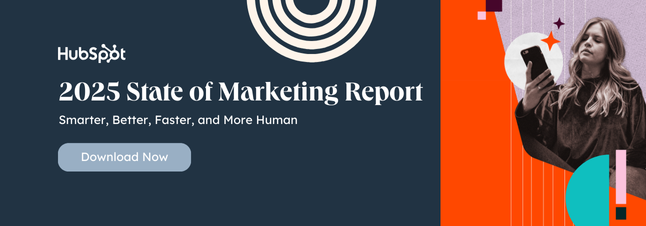- Like
- SHARE
- Digg
- Del
- Tumblr
- VKontakte
- Flattr
- Buffer
- Love This
- Save
- Odnoklassniki
- Meneame
- Blogger
- Amazon
- Yahoo Mail
- Gmail
- AOL
- Newsvine
- HackerNews
- Evernote
- MySpace
- Mail.ru
- Viadeo
- Line
- Comments
- Yummly
- SMS
- Viber
- Telegram
- JOIN
- Skype
- Facebook Messenger
- Kakao
- LiveJournal
- Yammer
- Edgar
- Fintel
- Mix
- Instapaper
- Copy Link
Social media is everywhere. For many people, social media is used daily for entertainment, socialization, and even news consumption — myself included.
Additionally, over the last two decades, it has risen as one of the primary marketing channels.
With over 40% of the world’s population on social media, it’s critical your business devise an effective social media strategy to reach your intended audience.
But whether you’re pitching a social media campaign to your boss or deciding which social media platform your business should put paid advertising behind, it’s vital you use data to support your efforts.
Here, we’ve compiled a list of essential social media stats to ensure you know where to focus your marketing efforts in 2020 to get the highest ROI.
Social Media Marketing Statistics/Data 2020
- Nearly 50% of the world’s population uses social media. That’s over 3 billion users worldwide. (Statista)
- In 2019, 90.4% of Millennials, 77.5% of Generation X, and 48.2% of Baby Boomers were active social media users. (Emarketer)
- 54% of social browsers use social media to research products. (GlobalWebIndex)
- Each person spends an average of 2 hours and 22 minutes on social networks and messaging. (Globalwebindex)
- 321 million new people joined social media in 2019, which brought the total from 3.48 billion to 3.8 billion social media users (an increase of 9%) in 2020. (Hootsuite)
- Millennials are logged on to social media for an average of two hours and 38 minutes daily while Gen Z logs on for two hours and 55 minutes. (World Economic Forum)
Facebook Statistics
- Facebook usage among teens is dropping gradually according to the latest social media statistics. While 71% of teens claimed to use the platform in 2015, the number has now dropped to 51%. (Pew Research Center)
- 68% of Americans use Facebook. (Pew Research Center)
- 74% of Facebook users check it daily. (Pew Research Center)
- Most people access Facebook around eight times each day. (SmartInsights)
- 96% of Facebook users access it on mobile. (Statista)
- If your Facebook ads contain images, then they will be between 75% and 90% more effective. (Consumer Acquisition)
- 93% of social media advertisers use Facebook ads on a regular basis. (Social Media Examiner)
- At least 3% of Facebook profiles are fake. (Facebook)
- The best time to post on Facebook is weekdays between 10 a.m. and 3 p.m. Wednesday is the best day to post while Sundays show the least traffic. (Sprout Social)
- .6% of marketers use Facebook video ads. (Buffer)
- Facebook Stories has 500 million daily viewers. (TechCrunch)
- With 36% of viewers watching political Story content, politics is the top-Facebook Stories topic. (Statista)
Video promotions are equally as important as photo promotions. (Social Bakers)
81% of businesses prefer video marketing on Facebook. (Buffer)
For more stats related to Facebook, Facebook Stories, and Facebook Ads, check out this detailed list.
Twitter Statistics
- Twitter has more than 330 million monthly active users. (Statista)
- In Q3 of 2019, Twitter had more than 145 million monetizable daily active users — a 17% YoY growth. (Twitter)
- Twitter’s 2019 Q3 revenue was $824 million, or 9% higher than Q3 in 2018. (Twitter)
- 22% of adults in the U.S. use Twitter, down from 24% in 2018. (Statista)
- Link clicks account for 92% of all user interaction with tweets. (HubSpot)
- 83% of the people who sent a Tweet to a company and received a response, felt better about the company and were more likely to do business with them. (Twitter)
- Only 3% of Tweets about customer service issues call out the company’s username with the @ symbol. (Marketing Land)
- People are 31% more likely to recall what they saw on Twitter vs. general online browsing. (Twitter)
- 53% of users say they bought a product they first saw on Twitter. (WebFX)
- Twitter ads are 11% more effective than TV ads during live events. (Twitter)
- The best times to post on Twitter are Wednesdays at 9am and Fridays at 9am. The best days to post are Tuesday and Wednesday, while Saturday sees the least engagement. (Sprout Social)
For more on Twitter, check out Twitter Marketing in 2020: The Ultimate Guide.
Instagram Statistics
- As of late 2019, Instagram has 1 billion monthly active users, and 500 million of them use it daily. (Statista)
- Instagram continues to attract a younger audience with 72% of teens saying that they use the platform. (Sprout Social)
- 64% of Instagram users are under the age of 34. (Statista)
- Ad spending on Instagram is 23% higher than on Facebook according to an internal analysis by Merkle. (DigiDay)
- Videos get 21.2% more interactions compared to images and 18.6% more interactions compared to carousels. (Sprout Social)
- 71% of US businesses use Instagram. It surpassed Twitter in business users in 2017. (eMarketer)
- The best times to post on Instagram are Wednesday at 11am and Friday from 10-11am. Wednesday is the overall best day to post while Sunday sees the least amount of engagement. (Sprout Social)
- Between 2016 and 2020, eMarketer estimates Instagram added 26.9 million users — almost double the incremental users expected for Twitter, and far more than any other social platform tracked. (eMarketer)

- In 2019, an estimated 25% of Facebook’s total ad revenue came from Instagram. By the end of 2020, Instagram’s share of that revenue will grow to 30% globally. (Recode)
For more Instagram stats, click here.
LinkedIn Statistics
- LinkedIn has more than 690 million active users. (LinkedIn)
- In Q1 of 2020, LinkedIn sessions increased 22 percent year-over-year. (LinkedIn)
- In Q2 of 2020, LinkedIn revenue increased 21 percent year-over-year (LinkedIn)
- In 2019, LinkedIn made more than 6.8 billion in revenue. (LinkedIn)
- Marketing Solutions is LinkedIn’s fastest-growing segment. It grew 44 percent year-over-year in Q1. (LinkedIn)
- LinkedIn received 30 billion sessions from its members in 2019. This was a year-over-year increase of 27 percent. (LinkedIn)
- In 2019, LinkedIn was voted the most trusted network. (Business Insider)
- 80% of social media B2B leads come from LinkedIn. (LinkedIn)
- Over 46% of all social media traffic to company websites comes from LinkedIn. (LinkedIn)
- The best times to post on LinkedIn are Wednesdays from 9-10 a.m. and 12 p.m. The best day for posting is Wednesday and the day with the least engagement is Sunday. (Sprout Social)
Want to learn how to up your marketing game on LinkedIn? This post walks you through the ins and outs of using LinkedIn for business.
YouTube Statistics
- YouTube is the second-largest search engine globally. (HubSpot)
- YouTube is the preferred form of social media marketing worldwide. 83% of all consumers prefer it. (Hubspot)
- 54% of all people want marketers to put out more video content, and this is an excellent place to begin. (Hubspot)
- Most of YouTube’s user base is male. The ratio is 55% men to 45% women. (Journalism.org)
On mobile devices alone, YouTube reaches more adults aged 18 to 49 during prime time than any cable network does in an average week. (Think With Google)
75% of adults report watching YouTube on their mobile devices. (Think With Google)
More than 70% of YouTube watch time is generated from mobile devices. (YouTube)
- 96% of all teens in the United States use YouTube. (Forrester)
TikTok Stats
- According to a leaked advertising pitch deck from October 2019, TikTok reports having 800 million monthly active users worldwide. (AdAge)
- Douyin, TikTok’s original standalone app in China, had 300 million users at the time Musical.ly merged with TikTok. (The Verge)
- In early 2019, TikTok was the third-most downloaded app globally. (Business of Apps)
- By February 2019, TikTok hit 1 billion downloads, beating Instagram and Facebook in app stores. (Business Insider)
- Roughly 50% of TikTok’s global audience is under the age of 34 with 26% between 18 and 24. (MarketingCharts)
- Just over one in eight adults have joined TikTok. (MarketingCharts)
- 56% of TikTok users are male. (AppApeLab)
For more on TikTok, check out this blog post on its growth and popularity.
Reddit Stats
- Between 2017 and 2019 Reddit grew from 330 million monthly active users to 430 million. (Reddit)
- The site receives more than 21 billion monthly screen views. (Reddit)
- While Reddit was reportedly sold for between $10-$20 million, the company’s valuation grew to 1.8 billion after 2017 funding rounds. (CNBC)
- Reddit is predominantly male. 15% of male internet users between 18 to 29 say they use Reddit. (Pew Research Center)
- Only 10% of female internet users under 50 say they use Reddit. (Pew Research Center)
Want to determine if Reddit is right for you? Read this blog post for 27 more Reddit stats.
Social Media Consulting Services
Many businesses hire external social media consulting agencies to manage their voice and reputation online. Alternatively, some businesses create roles in-house for a social media consultant — this is someone who is responsible for increasing brand awareness, responding to customer service complaints across social media platforms, and engaging with your audience online.
Whether you’re considering hiring an external social media consulting service or creating a role in-house, take a look at these trends that demonstrate the importance of social media consulting:
- 71% of consumers who’ve had a good social media service experience with a brand are likely to recommend it to others. (Ambassador)
- 80% of companies online are under the impression that they deliver exceptional social media customer service, while only 8% of their customers say they agree. (Smart Insights)
- 73% of marketers believe that their efforts through social media marketing have been “somewhat effective” or “very effective” for their business. (Buffer)
- Social networks are the biggest source of inspiration for consumer purchases with 37% of consumers finding purchase inspiration through the channel. (PWC)
- Social media is the most relevant advertising channel for 50% of Gen Z and 42% of millennials. (Adobe)
- 50% of consumers say that seeing user-generated content would increase their chances of buying products through a brand’s social media. (Curalate)
Social Media Consulting Proposal
All these stats have given you the data you need to work with — now it’s time to put your knowledge to use and create your own social media consulting proposal.
If you’re a social media consultant and you’re pitching a branding, marketing, or advertising campaign to a client, it’s critical you’re able to show how you’ll help your client grow their business.
Here are six steps you’ll need to take to ensure your social media consulting proposal or business plan is effective:
- Set clear goals. Figure out exactly where your company or client wants to go as far as their business and social media numbers. The clearer and more detailed the vision, the better. Follow SMART Goal guidelines to ensure that you’re on the right track.
- Understand your customers. Know who your target demographics are, because these are the people you’re trying to reach and engage. Gather your own social media statistics and use existing data your company or client might already have to figure out who’s interacting with the business and who might be good future prospects to reach. After you’ve done your research, you can create useful character personas to help you better understand and categorize customers.
- Understand your competition. Those “similar-but-different” companies are going to be out there. And, as with most aspects of the business world, the better you know them, the better you can know how to have a leg up on them. You can conduct this research at the same time you’re researching your customers, because chances are they’re interacting with competitors as well. Once you’ve gathered the data on your competitors, one of the most effective ways to use it is to figure out where there might be voids in their services that your business can fill.
- Be familiar with any existing social media presence. If you’re hired to run a company’s social media accounts, it’s critical you know about any previous social media postings, accounts, and experiments. By understanding what your client has already tried, you’re better equipped to take them where they need to go in the future.
- Don’t forget to pull your data. Before your new implemented strategies go underway, it’s important to collect a baseline of how it was before, so that you have something to measure against in the future. For example, if you take inventory of how many views you’re getting on Instagram Stories before the new strategy is in effect, you can see if the new ideas are improving these numbers or not. It’s important to keep a close eye on what is affecting your growth (positively or negatively) so that you know when you’re on the right track or when you need to try something new so your business can keep growing.
- Develop your strategy based on your findings. Define what your content will be, what platforms it will be distributed on, and how it will vary between platforms. Figure out smaller details at this stage too, like your client’s tone and voice on social media (either what it currently is or what it should be), along with design and style elements. Always be sure you’re staying true to your company or client’s brand by consulting with existing materials like mission statements, guides, or brand books.
Finally, take a look at HubSpot’s free Marketing proposal template (useful for both PDF & Word) to get you started creating a comprehensive social media consulting proposal.
Let data drive your social strategy.
Social media marketing statistics can show you the state of the business world today, where it might be going, and how you can ensure your business is continuously meeting customers where they want to be met. Use these statistics to your advantage to help you understand what you need to do to effectively use social media for your business today.
Editor’s Note: This blog post was originally published in August 2019, but was updated for comprehensiveness and freshness in May 2020.
Originally published Jun 2, 2020 1:30:00 PM, updated June 02 2020




![how-to-create-detailed-buyer-personas-for-your-business-[free-persona-template]](https://everythingflex.com/wp-content/uploads/2020/06/6257/how-to-create-detailed-buyer-personas-for-your-business-free-persona-template-150x150.jpg-23keepprotocol)
